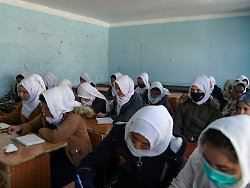Friday, December 03, 2021
Seeking aid
Taliban decree prohibits forced marriage
When the Taliban came to power, the situation for women deteriorated significantly. A decree is now supposed to guarantee them some basic rights. However, there is no information on important topics such as education or work. The Islamists hope for international aid.
In Afghanistan, three and a half months after their return to power, the militant Islamist Taliban advocated respect for certain women’s rights. In a recently published decree, they directed organizations, religious scholars and elders to take serious action to enforce women’s rights. It literally says: “A woman is not property, but a noble and free person.”
So far, since taking power in mid-August, the Islamists have again significantly restricted women’s rights. The decree states that one of the rights is that no one should force an unmarried woman or a widow into marriage. Nor should women make women available to anyone in exchange for peace or to end hostility. In Afghanistan it happens again and again that a woman is given as reparation in a family feud, for example.
Widows would also have a right to an inheritance and a bridal gift should they marry again. The decree also calls on two ministries and the courts to ensure that these rights are made known and implemented. The positions in the decree are not entirely new and also correspond to the rules of Islam. The previous Afghan laws also guaranteed these rights. However, they were often not granted even before the Taliban came to power. They were often not enforceable in court.
The new decree does not provide any information on women’s rights to education or work. The Islamists have noticeably curtailed women’s rights since their return to power. In many cases they cannot go back to their jobs. Most girls’ secondary schools are closed. Street protests by activists were violently suppressed. Many fled the country.
Women’s rights as a prerequisite for money
The Taliban are striving to regain access to billions in aid that were blocked after the collapse of the West-backed government. The main donor countries cite the preservation of women’s rights as a prerequisite for resuming aid.
During the Taliban’s rule from 1996 to 2001, women had virtually no rights. They had to wear the completely veiled burqa, were only allowed to go into public with a male companion and were excluded from schooling and work.
